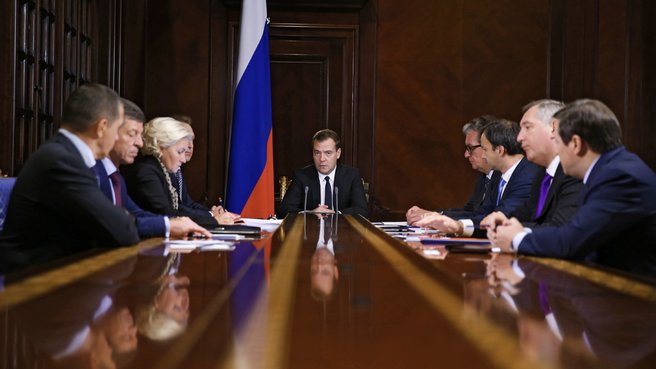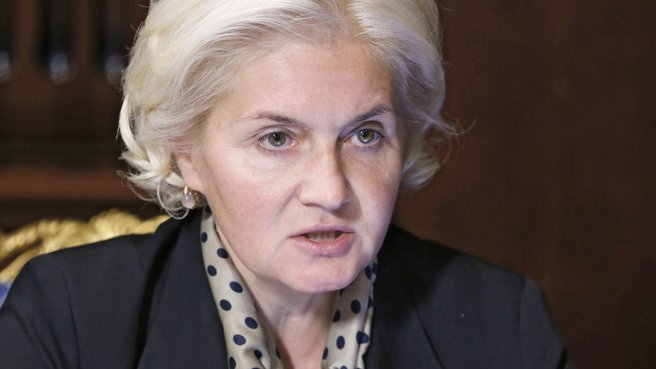Dmitry Medvedev’s opening address
Igor Shuvalov's report on Armenia’s accession to the Customs Union of Russia, Belarus and Kazakhstan
Olga Golodets' report on employment of the population in Russia
Transcript:
Dmitry Medvedev: Now, briefly about integration. From the very beginning of the Customs Union and the Common Economic Space, and as soon as we started advancing toward the Eurasian Economic Union, we have been saying that this project is open to our partners, especially the CIS countries. It was encouraging at a recently held presidential meeting to hear about Armenia's decision to join the Customs Union of Russia, Belarus and Kazakhstan, and later to participate in the formation of the Eurasian Economic Union. Of course, we support this decision of our Armenian colleagues. We maintain close economic ties with Armenia, not to mention political and other contacts. We are implementing joint infrastructure projects, and accession to the Customs Union will open up additional opportunities for Armenia. However, this membership has its specific features, because Armenia does not have common borders with the countries of the Customs Union. Special measures will have to be taken in to order to address these features. Mr Shuvalov, what practical steps do you have in mind?
Igor Shuvalov: Mr Medvedev, colleagues, as you are aware, the Customs Union of Russia, Belarus and Kazakhstan is fully operational, and we are now deploying the common economic space within the borders of the common customs space. We are now working to draft an agreement on the establishment of the Eurasian Economic Union by May 2014 and are carrying out measures to ensure that this union becomes operational on January 1, 2015. Back when we were at the first level of integration – when we established the Customs Union – Kyrgyzstan officially applied for membership in the Customs Union. Since then, the working group has made a specific action plan available to the leaders of Kyrgyzstan, and we are currently working according to this plan. The most challenging thing in making Kyrgyzstan part of the Customs Union is to agree on withdrawals under the uniform customs tariff which would satisfy all parties. This work is underway.
After the President of Armenia announced on September 3 that Armenia plans to join the Customs Union, the representatives of the Russian Government and the Eurasian Economic Commission have been holding talks on how to make this a reality.
Several approaches have been developed so far. The Supreme Economic Council will meet at the level of heads of government on September 25. If all the parties agree to cooperate with the Republic of Armenia, we will put together a report for the presidents of the three countries. In October, when the Supreme Economic Council at the level of heads of state will convene, we will get the go-ahead signal from the Eurasian Economic Commission’s board to begin negotiations with the Republic of Armenia.
It is already clear that the accession to the Customs Code of the Customs Union, the adoption of commitments under the common customs tariff and our shared commitments, such as phytosanitary measures and technical regulations, is a fairly complicated thing to do and will take time to accomplish.
Experts say that we can agree with the Customs Union candidate that the main provisions of the first level of integration can be agreed upon by May 2014 as we develop the draft treaty on the Eurasian Economic Union. It's hard work, but we can do it.
Dmitry Medvedev: In any case, this is the right course of action, because we are really ready for further integration with Kyrgyzstan and Armenia. Most importantly, they should do what it takes to get there.
Igor Shuvalov: Mr Medvedev, please allow me to apprise you and our colleagues of the outcome of the work done by lawyers in connection with the negotiations in Moscow between the government delegations of the Russian Federation and Ukraine.
Dmitry Medvedev: Go ahead.
Igor Shuvalov: We asked international lawyers from the government agencies, as well as independent lawyers, to compare current regulations from the associated membership agreement and the comprehensive free trade area between the EU and Ukraine with the fundamental documents that underlie the Customs Union and the Common Economic Space. Their conclusion is that these regulations are not compatible, and if the agreement between Ukraine and the EU is signed and goes into effect, then Ukraine won’t be able to assume several key Customs Union obligations, including common customs tariffs, meaning that a single customs territory will not be established. This issue raises a lot of questions... However, the lawyers are unanimous in their findings: these regulatory systems are incompatible.
Dmitry Medvedev: It’s good that the experts have performed this work, because we agreed on this with the Ukrainian leaders. I met with my Ukrainian counterpart Mykola Azarov to discuss this issue. I don’t want anyone to have any illusions in this regard, because the situation is quite simple: as soon as our Ukrainian partners sign the associated membership agreement with the European Union, the door to the Customs Union will be shut for them. By the way, the EU executives are quite open about this, too, although occasionally this acknowledgment is shrouded in rhetoric. I think that everyone, including Ukrainian citizens, should realise that the Ukrainian leadership is about to make a pivotal political choice.
Dmitry Medvedev: In general, the unemployment indicators are not bad, and frankly, compared with other European countries, they are even excellent. There are currently fewer unemployed people than last year.
Now, let’s return to domestic affairs. Employment is an extremely important issue. We continuously monitor the unemployment indicators, as we consider them critical to overall social wellbeing. In general, the indicators are not bad, and frankly, compared with other European countries, they are even excellent. There are currently fewer unemployed people than last year. However, conditions in the labour market vary, and there is considerable risk of layoffs at some enterprises. Young professionals often cannot find a job, which is bad. The most difficult situation is in so-called single industry towns where there is no opportunity to find another employer. On the other hand, our labour market always suffers from a chronic shortage of workers. Ms Golodets (addressing Olga Golodets), what measures are we taking now, taking into account the Employment Support state programme and some other instruments?
Olga Golodets: Mr Medvedev, colleagues, indeed some proposals have been developed under the New Employment programme. As already noted, the unemployment rate remains low in Russia at 5.3% (944,000 people are registered with the employment service). But the situation varies from district to district and city to city, and among different social groups.
We have identified 360 communities suffering from chronic unemployment problems. The unemployment rate exceeds 25% in these places, and the absence of a major employer affects economic and labour market conditions.
The second topic addressed in the new employment programme is first-time job seekers. Unfortunately, major part of the unemployed are young people who do not have any work experience and do not meet employers’ requirements for one reason or another.
The third category is people with disabilities. The pace of hiring people with disabilities is unsatisfactory, as there are over 800,000 disabled job seekers. It is important for them both in economic and social terms. That is why we have developed this new programme which incentivises employers to hire residents of economically depressed regions and districts, first-time job seekers, and people with disabilities. With respect to the first two categories, we plan to significantly increase labour mobility by supporting programmes for shift work and labour mobility. This programme provides residents of depressed regions and young people with new opportunities. We believe that a young man working under this programme for three years will have enough money to start a family.
The general programme is meant to last three years, and according to our estimates and proposals, its annual funding will stand at 45 billion roubles. We have started to discuss it with other members of the Government.
Dmitry Medvedev: Thank you. Of course, we should move forward in all directions. I would like us to pay special attention to single industry towns. I think we should hold a meeting. Please prepare the agenda, and I’ll hold a meeting.
Olga Golodets: Certainly.
Dmitry Medvedev: Thank you.













